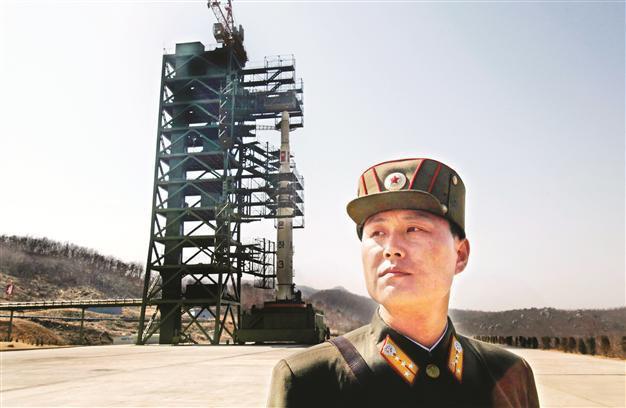Allies give N Korea cold shoulder over launch
MOSCOW / BEIJING

A soldier stands guard in front of a rocket sitting on a launch pad at the West Sea Satellite Launch Site in the northwest of Pyongyang in this April photo. A file satellite image (below) shows the Sohae Satellite Launch Station in North Pyongan Province, where N Korea is preparing to launch a rocket soon. REUTERS photo
North Korea has installed the first stage of a long-range rocket it plans to launch this month in position, defying calls from its two main allies, Russia and China, and criticisms from the international community.“We urgently appeal to the government [of North Korea] to reconsider the decision to launch a rocket,” the Russian Foreign Ministry said in a statement. Echoing its criticism of the April launch, Russia said North Korea had been warned not to ignore a U.N. Security Council resolution which “unambiguously prohibits [it] from launching rockets using ballistic technology.” China was not so direct in its criticism of North Korea, but urged “all sides” not to take any action that “worsens the problem.”
“China believes that maintaining peace and stability on the Korean peninsula and in Northeast Asia accords with the interests of all sides and is the joint responsibility of all sides,” Foreign Ministry spokesman Hong Lei said. “In the present circumstances, we hope all sides can be calm and restrained and not take any moves to worsen the problem. China will remain in touch and coordinate with all sides.”
Tokyo deploys Patriots
North Korea announced Dec. 1 the decision to launch another space satellite and reportedly told neighbors it would take a similar path to that planned for a failed rocket launch in April. North Korea insists it is a purely “peaceful, scientific” mission aimed at placing a polar-orbiting earth observation satellite in orbit. Russia said North Korea would only be allowed to exercise its right to peaceful activity in space if the U.N.-imposed restrictions were lifted.
The U.S. and key Asian allies South Korea and Japan have also condemned the launch as a disguised ballistic missile test that violates U.N. resolutions triggered by Pyongyang’s two nuclear tests in 2006 and 2009. U.S. State Department spokeswoman Victoria Nuland condemned the launch on Dec. 2 as a provocative threat to the region. A South Korean government source said the first stage had been placed in position at the North’s Sohae satellite launch station. The source said it was expected to take three or four days for North Korea to erect all three stages.
Japan canceled scheduled diplomatic talks with North Korea after the rocket launch announcement and has reportedly issued orders to shoot down the carrier if it strays into Japanese territory. Tokyo has begun deploying a surface-to-air missile defense system and is putting its armed forces on standby ahead of the planned launch.
Public broadcaster NHK reported that a naval vessel carrying PAC-3 (Patriot Advanced Capability-3) ballistic missiles left a western Japan naval base yesterday, headed for the country’s southern Okinawa island chain. Defense Minister Satoshi Morimoto ordered the military to prepare for the rocket launch, with a Defense Ministry spokesman saying “our ground, marine, and air forces are now preparing to deploy troops in Okinawa,” which the rocket may fly over. Tokyo is also planning to deploy Aegis warships in neighboring waters.
















